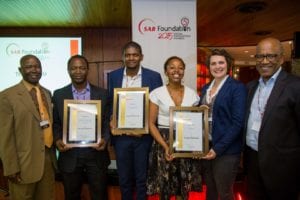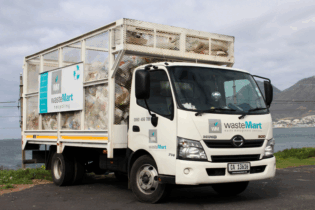Owner of Khepri Biosciences, Bandile Dlabantu from the Eastern Cape, was awarded a prize of R1.2-million for the commercialisation of a cost-effective waste management method for food producers and abattoirs.
The invention comprises a container unit able to process organic waste onsite using fly larvae, with a 40% reduction of the waste products. The larvae are converted into low cost animal feed protein. Judges said the insect production unit would assist local emerging famers, particularly chicken farmers, reduce their feed bills. “It offers a replacement which is equally as nutritious as fish meal and is more sustainable,” says Bridgit Evans, SAB foundation manager. The winning innovation was cost effective, sustainable and replicable, and would have a significant impact on social problems, particularly for people in rural areas, the judging panel said. High standard of entrants “While all of this year’s entrants were of such an extremely high standard that for the first time ever, all 14 finalists were given some kind of seed funding, what made Bandile’s project stand out was his out-grower scheme which allows for increased job opportunities through partnerships with rural communities in running small scale fly farms,” says Evans. First place “The prize from the SAB Foundation allows us to commission the first six mobile fly farms for our pilot facility a Chamdor abattoir that will process 100% of the waste produced by the abattoir daily,” said Dlabantu. “This site would employ 10 people permanently and three part-time allowing us the opportunity to raise the funding that will build a plant with a capacity to take 60% of the organic waste in Gauteng and produce 100 000 tons of animal feed protein in five years’ time.”Second place
Gradesmatch, an innovative system designed to enhance the way in which high school learners interact with higher learning institution and bursars in South Africa, was awarded the second place grant of R600 000. The innovation matches learners’ high school marks with the institution entrance requirements. Gradesmatch breaks down the student’s results by subject, showing them how to improve or alternative paths to follow best suited to their strengths, whilst also providing career information. Third place Third place winner Lakheni, which gives low income families access to discounted food items, won a R400 000 grant. Lakheni provides poorly resourced crèches with a stable income stream that will enable them to deliver better services and be better equipped to nourish young children. Foundation focuses on making an impact All winners receive their grant funding in tranches determined by their growth plan to commercialise and upscale the service and product. “The prize money for all categories was increased this year because we want the award to have an impact and inflation has taken its toll over the years. SAB believes that investing in the country’s entrepreneurs will help to grow SA’s economy. Each year we look for innovations which address social challenges and assist our intended beneficiaries – women, youth, people with disabilities and people living in rural areas,” said Evans. The SAB Social Innovation Awards has to date invested R20 million in 63 innovations which are geared to develop the SAB Foundation’s core beneficiaries.






